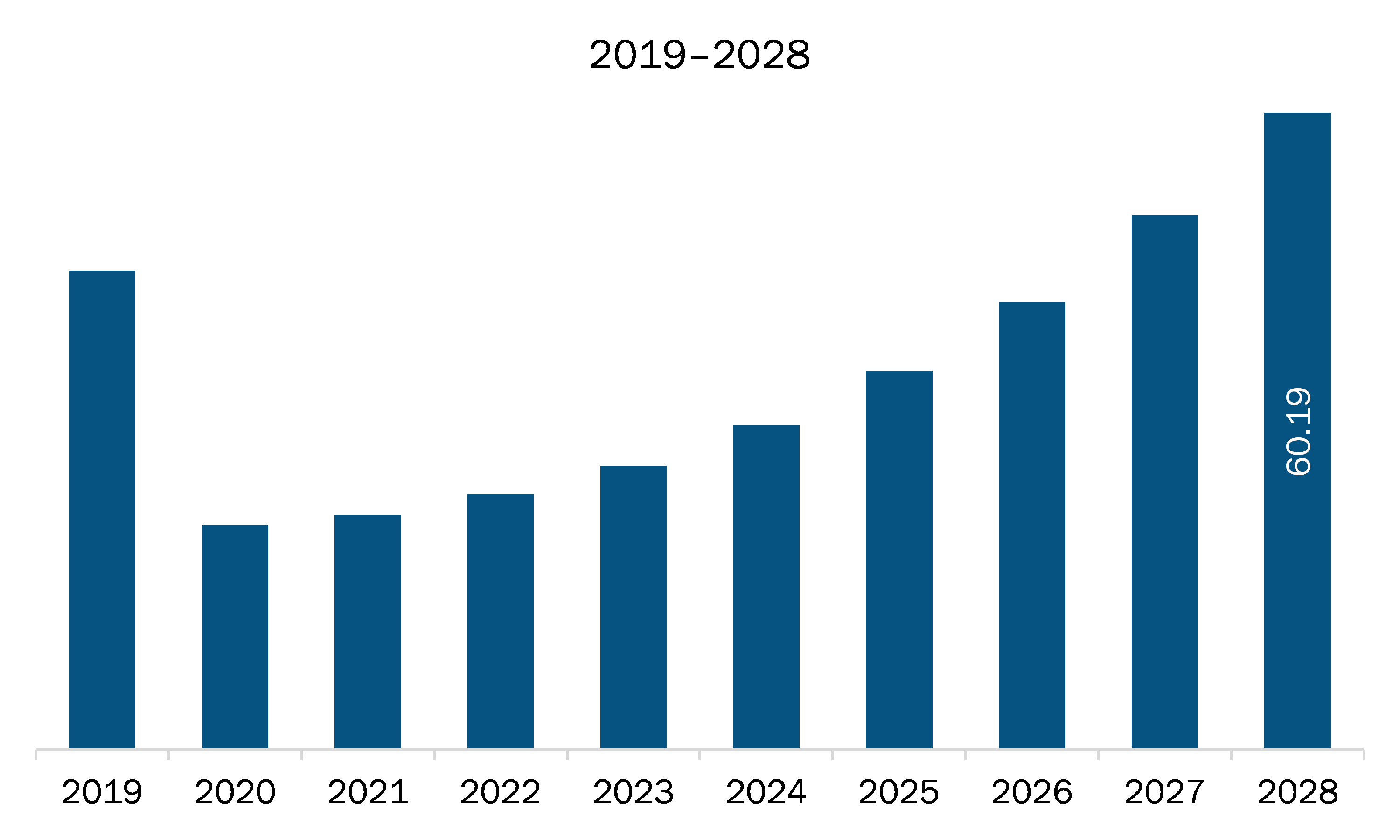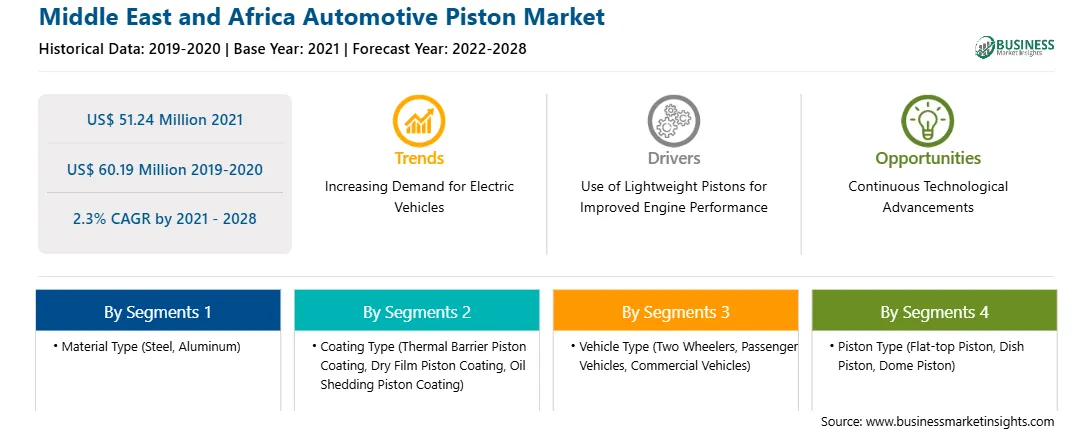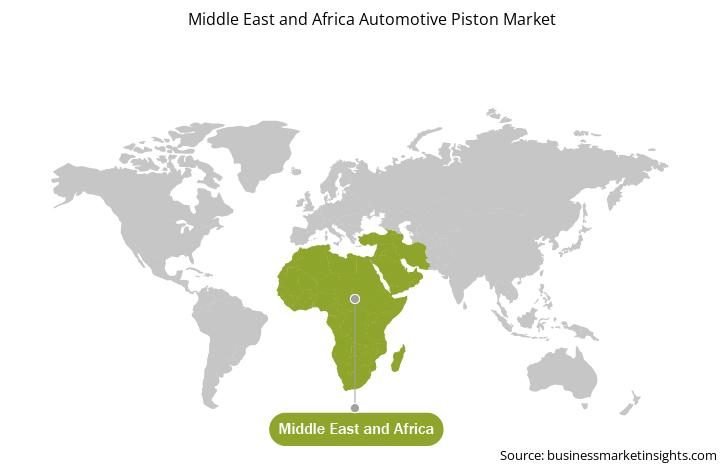The automotive piston market in MEA is bifurcated into South Africa and the Rest of MEA. The automotive sector in the region is growing at a steady pace. The rising demand for commercial vehicles in the MEA can be attributed to increasing development and infrastructure operations in many countries. Furthermore, growth in e-commerce is expected to propel the demand for commercial vehicles, such as trucks, across the region. Moreover, MEA has a presence of a few automotive manufacturers such as MAN Truck and Bus Middle East FZE, Volvo Group Middle East FZE, Hino Motors Ltd., Ashok Leyland, Mercedes-Benz KSA Commercial Vehicles, and Tata Motors Limited. Evolution of robust ICE vehicle engines is the major factor driving the growth of the MEA automotive piston market.
The automotive piston market in Middle East and Africa has witnessed a decline due to disruption in the supply chain, various containment measure initiated by the government, such as travel restrictions, factory shutdown, and lockdowns, the supply, and distribution of electronics and mechanical automotive component. Impact on raw material supply and revenue stream has severely reduced the demand for automotive vehicle and therefore, demand for automotive piston has also declined. South Africa accounts for a major share in MEA’s automotive sector. Closure of production factories have had an enormous impact on South Africa automotive sector as the country heavily relies on imports. The MEA region is focusing on local production as a measure to meet local market demands and avoid uncertainties. In the view of the pandemic, several automotive piston market players in the MENA region are introducing innovative green and environment friendly technologies to recover sales.

Strategic insights for the Middle East and Africa Automotive Piston provides data-driven analysis of the industry landscape, including current trends, key players, and regional nuances. These insights offer actionable recommendations, enabling readers to differentiate themselves from competitors by identifying untapped segments or developing unique value propositions. Leveraging data analytics, these insights help industry players anticipate the market shifts, whether investors, manufacturers, or other stakeholders. A future-oriented perspective is essential, helping stakeholders anticipate market shifts and position themselves for long-term success in this dynamic region. Ultimately, effective strategic insights empower readers to make informed decisions that drive profitability and achieve their business objectives within the market.

| Report Attribute | Details |
|---|---|
| Market size in 2021 | US$ 51.24 Million |
| Market Size by 2028 | US$ 60.19 Million |
| Global CAGR (2021 - 2028) | 2.3% |
| Historical Data | 2019-2020 |
| Forecast period | 2022-2028 |
| Segments Covered |
By Material Type
|
| Regions and Countries Covered | Middle East and Africa
|
| Market leaders and key company profiles |
The geographic scope of the Middle East and Africa Automotive Piston refers to the specific areas in which a business operates and competes. Understanding local distinctions, such as diverse consumer preferences (e.g., demand for specific plug types or battery backup durations), varying economic conditions, and regulatory environments, is crucial for tailoring strategies to specific markets. Businesses can expand their reach by identifying underserved areas or adapting their offerings to meet local demands. A clear market focus allows for more effective resource allocation, targeted marketing campaigns, and better positioning against local competitors, ultimately driving growth in those targeted areas.

The automotive piston market in MEA is expected to grow from US$ 51.24 million in 2021 to US$ 60.19 million by 2028; it is estimated to grow at a CAGR of 2.3% from 2021 to 2028. The invention and use of carbon-carbon composite materials in piston manufacturing, has led to reduction piston weight of engine components allowing the piston to run at higher speeds. This has encouraged manufacturers in the automotive piston market to opt for carbon-carbon composite materials over conventional materials, such as aluminum, to achieve improved engine performance. Silicon composites and magnesium are also expected to unfold various opportunities for new products in recent years. The use of lightweight pistons leads to a reduction in engine weight. It benefits ICE vehicles through greater fuel efficiency and pollution reduction. Government initiatives to promote the use of clean energy are enabling automotive engine manufacturers to adopt lightweight hybrid composite materials that provide improved properties over the commercially available aluminum-based components. The automotive pistons manufactured using lightweight hybrid composite materials are ~25% lighter in weight than those made from conventional materials; moreover, the former enables cost-saving of over 62%. Thus, the performance and cost benefits of lightweight pistons are encouraging the automotive sector participants to invest in innovative designs, thus bolstering automotive piston market growth.
The MEA automotive piston market is segmented on the bases of material type, coating type, vehicle type, and piston type, and country. Based on material type, the market is segmented into steel and aluminum. The aluminum segment dominated the market in 2020 and steel segment is expected to be the fastest growing during the forecast period. On the basis of coating type, the automotive piston market is segmented into thermal barrier piston coating, dry film lubricant piston coating, and oil shedding piston coating. The thermal barrier piston coating segment dominated the market in 2020 and dry film piston coating segment is expected to be the fastest growing during the forecast period. On the basis of vehicle type, the automotive piston market, by vehicle type, is segmented into two wheelers, passenger vehicles, and commercial vehicles. The commercial vehicles segment dominated the market in is expected to be the fastest growing during the forecast period. On the basis of piston type, the automotive piston market is segmented into flat-top piston, dome piston, and dish piston. The flat-top piston segment dominated the market in 2020 and dome piston segment is expected to be the fastest growing during the forecast period.
A few major primary and secondary sources referred to for preparing this report on the automotive market in MEA are company websites, annual reports, financial reports, national government documents, and statistical database, among others. Major companies listed in the report are MAHLE GmbH; QUFU JINHUANG PISTON CO., LTD; Rheinmetall Automotive AG; Shandong Binzhou Bohai Piston Co., Ltd; and Tenneco Inc. are among others.
The Middle East and Africa Automotive Piston Market is valued at US$ 51.24 Million in 2021, it is projected to reach US$ 60.19 Million by 2028.
As per our report Middle East and Africa Automotive Piston Market, the market size is valued at US$ 51.24 Million in 2021, projecting it to reach US$ 60.19 Million by 2028. This translates to a CAGR of approximately 2.3% during the forecast period.
The Middle East and Africa Automotive Piston Market report typically cover these key segments-
The historic period, base year, and forecast period can vary slightly depending on the specific market research report. However, for the Middle East and Africa Automotive Piston Market report:
The Middle East and Africa Automotive Piston Market is populated by several key players, each contributing to its growth and innovation. Some of the major players include:
The Middle East and Africa Automotive Piston Market report is valuable for diverse stakeholders, including:
Essentially, anyone involved in or considering involvement in the Middle East and Africa Automotive Piston Market value chain can benefit from the information contained in a comprehensive market report.